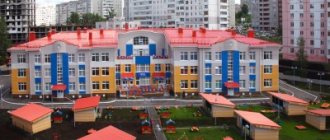Home / Real estate / Housing rights / Registration
Back
Published: September 19, 2016
Reading time: 9 min
0
1133
Every Russian must be registered somewhere, permanently or temporarily, and small citizens are no exception.
Since the housing market is now constantly in motion (something is sold, bought, changed), there is a need to free the apartment from the persons registered in it.
In fact, discharge is not very difficult, but children, as a specially protected group of the population by the state, are discharged from apartments with some nuances.
- General information
- How to discharge a child... ...not the owner
- ...owner
How to expel a child from an apartment without his consent if I am the owner
Minor children, citizens of the Russian Federation, are extremely protected by state legislation. For this reason, any actions that in any way violate their rights are impossible and illegal. And breaking the law leads to certain sanctions.
Discharging a child from an apartment is a process that requires compliance with many rules and the collection of a fairly voluminous package of documents. As you know, a child must have registration in the place where his mother and father live.
It is impossible not to have a registration for a child and this is enshrined in law. The child is obliged to belong to a certain entity in the country. This is carefully monitored by guardianship and trusteeship.
For this reason, if you are the new owner of an apartment where a child and his parents were previously registered, then you cannot expel him from there yourself, since the minor’s parents do not have a different registration.
From this we can conclude that it is impossible to discharge a child who is not yet 18 years old, but there are many nuances that can help find a way out of this situation.
Taking into account the Family and Civil Code of Russia, the discharge of a child is prohibited:
- If a child is discharged “to nowhere”, discharge without further registration to similar housing.
- If the minor is discharged and registered in a home where the conditions are much worse than the previous ones. For example, an old, dilapidated house, housing without renovation. In this case, the court will refuse to discharge the child.
- Registration of a minor child for the sale of his property despite the fact that it is his property.
- Discharging a child who has reached 14 years of age without his knowledge or consent.
- Other acts of discharge that are illegal.
You can see that many requirements and conditions are imposed on the discharge of minor citizens. For this reason, before discharging a child, it is necessary to comply with the following requirements:
- The interests of the child must be represented only by his representative by law.
- A child over 14 years of age must independently give consent to be removed from housing.
- The property where the discharged child will live must meet all requirements and not be inferior to the conditions where he lived before.
- All documentation that confirms the child’s identity, the actions of his guardian, and documents for real estate (old and new) must be present and executed legally.
So is it possible to sign a child out of an apartment if the citizen deregistering the child is the owner of the property? Yes, such a step is possible. You just need to understand how to carry out such a process correctly.
If the child is not the owner of the property, then obtaining consent from a legal representative is not required to remove him from the property.
In this case, in order to discharge the child, his representative is obliged to write at the passport office an application to remove the minor from registration. A child cannot write such a statement on his own if he is not yet 14 years old.
The following documentation must be attached to the application:
- Passport of the minor's representative.
- Birth certificate of a minor.
- Technical passport for the housing where the child will be registered.
After the required 3 days of document review, the child will be deregistered from your apartment.
Court
The child’s parents and the child himself are not always the homeowners. You can live with relatives for a certain time, having received registration from them. When moving to their own home, parents can leave the old registration with the child.
In this case, the owner of the apartment has the right to go to court in order to discharge a member of another family. But in court you will also need to prove that the child lives with his parents in good conditions, in sufficient living space.
But even in this case, the court will, first of all, proceed from the interests of the minor. The court also considers issues of discharge of a minor in cases where:
- the child has lost ownership of the apartment;
- if he has not acquired the right of ownership to use the housing;
- if he is deprived of the right to use the property;
A lawsuit regarding the problem that has arisen is filed in the court where the defendant lives. Representatives of the PLO must be present during court proceedings. If a child has already reached the age of 10, he can express his opinion on the issue in court, and court officials must take it into account when making a decision.
Extract from public housing
When discharging a child who has not yet turned 18 years old from municipal housing, there is a mandatory condition - normal living conditions in the new housing, which should not be inferior to the previous ones.
To understand everything better, let's look at an example: a child lives in separate housing, which is municipally owned. If he is discharged, he gets a place in a dormitory. The living space currently occupied by the child has become significantly smaller than the previous one. In such a situation, the Main Directorate for Migration Affairs of the VMD of the Russian Federation will cancel the registration at the new address and resume the previous one, in a municipal apartment.
How to discharge a child from the apartment in this case? Let's figure it out step by step:
- It is required to take an extract from the passport office stating that the minor lives and is registered in the apartment together with his parents. To receive an extract from the apartment, you must present the parent’s passport, the minor’s birth certificate and a social tenancy agreement for municipal housing to the passport office.
- In addition, you will need to take an extract from the passport office in the accounting department from your personal account.
- The guardianship and trusteeship authorities are required to obtain permission to discharge the child. To do this, you must write an application and attach the following documents to it:
- Passports of both parents or representatives of the child.
- Child's birth certificate.
- Social employment contract.
- A new contract for a social rental apartment or a purchase and sale agreement.
- Extract from the personal account.
- Certificate about citizens who are registered in this apartment.
- Technical passport of the apartment where the family is moving. You will also need a passport for the old apartment.
- Permission to discharge the child is issued by guardianship and trusteeship after 2 weeks.
- The passport provides permission from the guardianship authority to discharge the child. After this, the passport office formalizes the removal of the child from registration and registration. What is required to discharge a child:
- Write an application for the child’s discharge at the passport office.
- The application is required to provide a passport, birth certificate, social employment agreement and a permitting document from the guardianship authority for the process of discharging a minor.
- Fill out the departure form.
- After 3 days you will receive a statement.
Registration and registration at a different address is done only after deregistration from the old address.
Registration of a child at a new address in another city
The easiest way to obtain registration in another city is to purchase square meters there as property.
Grounds for permanent registration of a child together with his parents in another city :
- Title documents for personal property;
- Rental agreement for rental housing;
- Social tenancy agreement for a municipal or state apartment.
A young resident will definitely be registered from municipal housing at the old place of registration into his parents’ own apartment, but registration of a child into a municipal apartment from a privatized one is impossible. Parents can complete registration by arriving in another city where they have housing. At the same time, visit the passport office, multifunctional center, territorial department for resolving migration issues.
Experts advise taking the simultaneous steps of deregistration and new registration. It’s easier to do this on the Government Services portal. Another option is to remove the child from the previous registration in the locality where the family purchased new housing. Then you will not have to visit the migration service at your old place of registration.
There is no state fee for registering children.
It should be remembered that you must submit documents for registration of a minor in another city within one week from the date of arrival. The date is confirmed by travel documents. Please be aware that uniform rules for registering citizens apply, regardless of your region of residence. There is no state fee for registration actions.
Changing the registration of children can occur under different circumstances.
This list will help you find the information you need:
- It is important for parents who do not have their own home to know whether temporary registration is possible for a minor child and whether it is possible to place the child in kindergarten without registration. To register a child for kindergarten, you need a certificate of form No. 8, where to get a certificate of registration of a child, find out in this article.
- Find out how to register a child at the place of residence of one of the parents here and whether you will need permission to register the child.
- After a break in family ties, ex-spouses rarely maintain good relations, and there is no need to talk about the possibility of living together. Does the mother have the right to live at the place of registration of the child or does the father have the same right? Or can a father remove a child from an apartment without the mother’s consent?
- Sometimes the baby’s father and mother decide to live separately, for example, each with their own parents. Can a child be registered without the owner’s consent? Read here.
And to help future parents expecting a new addition to their family, we have prepared useful information on when to register a child after birth? It is better not to violate the registration deadlines to avoid a fine. Find out where a newborn baby is registered here.
Watch about the registration and discharge of minors in this video:
How to discharge a child from his father’s apartment and register him with his mother
It is always difficult to deregister a child who has not reached the age of 18 from the apartment, since the existence of laws very strictly regulates this process in order to prevent violation of the rights of a minor. Of course, the option of solving the problem without involving the court is the most preferable, since the spouses have the opportunity to carry out the procedure in a short period. Thus, for what period and what stages do parents need to go through when discharging a minor from father to mother?
- A visit to the guardianship authorities with the presentation of all documentation, where within 2 weeks a decision will be made on whether the child’s discharge is allowed or prohibited.
- Visit to the migration service. When authorizing deregistration from the guardianship authorities, you will also need to submit documentation to organize the procedure (documents will be reviewed from 3 days).
- After deregistering a child from the father’s apartment, it is necessary to register him in the mother’s apartment within 7 days, otherwise this decision on discharge will be unlawful.
The process itself seems quite simple, but don’t get your hopes up. When discharging children, guardianship authorities and other services express great caution. If the discharge is carried out from the father to the mother’s smaller apartment, or if the child’s rights are violated, the process will be stopped. In this case, you will need to go to court.
If the child’s parents are unable to reach mutual understanding on this issue, or if the migration services and guardianship authorities refuse to remove the child from registration, the parents will need to resolve this through judicial organizations.
In addition, the issue will need to be resolved through the courts when the father intends to discharge the minor without the mother’s knowledge. Each such case has subtleties, but the court decision is almost always made in favor of the child.
No parents or refusal
If a child does not have a mother or father, deregistration and registration are carried out in accordance with current legal requirements. The law states that a child is registered only with a parent (one or two). If it is planned to sell real estate owned by a child (in whole or in part), the approval of the Public Organization is required. In situations where parents live apart for a long time, permission from the other parent is required. From the above, the conclusion suggests itself that the re-registration of a minor from place to place without parents is prohibited. An exception is made for situations where discharge and registration occurs with the involvement of an official guardian. In this case, the process occurs in standard mode.
If a minor refuses to be removed from the property, the judge cannot make a decision “by force” in the absence of other housing. This applies to all the cases discussed above.
How to discharge a child from his grandmother's apartment and register him with his mother
There are quite frequent situations when a minor citizen is registered in his grandmother’s apartment, but his mother wants to re-register him in her apartment. In such a situation, no special difficulties should arise, because the child’s representative is the mother, and she registers the child at her place of registration. However, even in such situations there are many pitfalls.
If you simply want to deregister a child and register him in an apartment, then the registration of a minor citizen in another place of residence is carried out on the basis of the law. What are the main steps you should take:
- The mother must submit an application with supporting documentation to the passport office.
- The passport office and guardianship authorities are required to make a positive decision on the child’s discharge and only then can registration be carried out at a new address.
- You will be given a confirmation certificate.
It will not be possible to deregister a minor if the housing in which you are planning to register the child is worse than the previous one or the rights of the little citizen are infringed. This situation will end with the refusal of guardianship authorities.
The child must be registered at a different address within 2-5 days after discharge. If the child is not yet 14 years old, then his housing must coincide with the housing of his parents.
Forced discharge of minors
The rights of the child are very carefully protected by modern legislation. It is impossible to discharge a minor “on the street.” But there are several situations when a minor can be forcibly discharged.
A minor can only be discharged without following certain established rules through the courts!
This directly applies to those life cases when the child was registered separately from the parents. For example, the owners of the apartment are close relatives of the minor’s family.
After purchasing a new home, the family moves, but leaves the children's registration in the relatives' apartment. To remove minors from their apartment, owners must go through the courts. The judge will make a positive decision if the parents' housing is suitable for the children. This condition is strictly observed.
Another important rule is the registration of a young resident at the address of his parents’ residence. It must be strictly observed until he reaches adulthood. If the parents have suitable conditions for the child to live, other options will be considered.
It is difficult to say exactly what the solution will be in this case. Each case is individual, it all depends on many factors.
When selling an apartment
Is it possible to discharge children from an apartment when it is sold? Children under the age of 14 are legally incompetent. All documentation for the sale or purchase of an apartment is carried out by the parents or legal representatives of the child, and adolescents aged 14 to 18 years old take part in these transactions personally.
How to remove a child from an apartment when selling? According to the law, deregistration of an apartment upon sale is possible if all conditions are met:
- If a minor citizen owns a certain apartment share or is considered its owner, the guardianship authorities are required to make an approving decision on the sale of real estate and discharge the child. In the opposite situation, the transaction will be considered invalid. A positive decision from the guardianship authorities should follow in the case when the child independently renounces property rights. If there is an existing registration in the property that is planned to be put up for sale, but he is not the owner or co-owner of the property, then there is no need to visit the guardianship authorities.
- It is strictly forbidden to discharge a minor to “nowhere”. The size of the living space for the child’s registration and subsequent residence must be identical to the one from where he is being discharged. It is better if this living space is larger. In addition, a minor citizen will not be deregistered from a privatized apartment into a communal living space.
- Upon discharge, one of the parents will need a permission document from the second parent, who does not currently live with the minor child.
Note! If a minor citizen is registered in your apartment, but has not lived in it for a long time, then it will only be possible to remove him from registration thanks to the courts.
To deregister a child from a particular home, an application to the Federal Migration Service is required. This body directly registers citizens. But it is worth knowing that in order to de-register a child, you will need a number of auxiliary actions. Let's look at the aspects of the discharge of a minor citizen:
If the child is the owner of the property, then in order to de-register, it is necessary to contact the guardianship authorities to draw up a permit for the sale of the property and the discharge of the minor. To do this you will need to present a number of documents:
- Parental passports.
- Certificate of family composition.
- Birth certificate or passport if the child is over 14 years old.
- A document that certifies the right to housing that is subsequently sold.
- Preliminary agreement for the acquisition of other real estate.
- Technical passport of the housing being sold and the property being purchased.
If a minor citizen is already 14 years old, then he will need written permission to sell the apartment.
After approximately 14 days, the guardianship authorities, if the rights of the minor have not been violated, make a positive decision.
General information
Since the Russian Federation is a rule of law state, socially weak categories of citizens are under its special protection: disabled people and children.
The responsibility to protect the rights and property interests of children lies not only with
parents, but also at a special government body - the guardianship council. The council was created to ensure that the child is socially protected from illegal actions of strangers and even parents.
One of the requirements of the Civil Code is the rule that a child must live with one of the parents (Article 20).
At the same time, guardians and adoptive parents are equal to the status of parents.
Also in Russia there are rules for registration/discharge, which were developed by the Government and approved back in 1995 by Resolution No. 713.
You cannot violate the requirements of the Rules, otherwise it may result in trouble: the child’s discharge, as well as the sale or exchange transaction itself, may be cancelled.
If the child does not live in the apartment
In order to remove a child from an apartment in which he does not live, you will need to contact the district court and file a claim with documents that will confirm the fact that the child does not live in this apartment. As a rule, deregistration of a child who does not live in the apartment goes through the court. The main condition is that the child has not lived in this apartment for more than six months.
It is possible to resolve this issue without going to court if the parents independently deregister the child at this address. This often happens if the applicant makes it clear that the law will be on his side and he will win the court. Not many people choose to go to court.
If you plan to go to court, you will need to first contact the guardianship authorities. Without the consent of this authority, the child cannot be discharged, and if you were given a discharge of the child without the knowledge of the guardianship authorities, then such a decision will be challenged in court and the discharge will be annulled.
What documents are needed for discharge:
- Statement on the number of participants.
- Passports.
- Child's birth certificate.
- Documentation that confirms the right to use real estate.
- Permission from the guardianship authorities.
- Duty paid.
To obtain consent from the guardianship authorities you will need:
- Technical passport for the previous apartment and for the new one.
- Certificate about the number of citizens living in the apartment.
- Identity cards.
If it so happens that the child and his parents no longer live in the apartment that you decided to sell, and the registration still hangs on you, then initially you need to try to resolve the issue peacefully. Talk to the child's parents so that they can discharge the child themselves.
If it is not possible to talk, you can send a registered letter, which will indicate your requirements and indicate that if the answer is negative, you will resolve the issue through the court.
If this does not bring any results, then you need to go to court. A month later, the decision of the judicial authority will come into force, and you will receive a certificate of departure of the minor citizen.
Grounds for registration of a minor
The law states that a child can only be registered where at least one of the parents is registered, and the latter does not necessarily have to be the owner of the square meters.
Expert opinion
Elena Bondarenko
Higher legal education Specialization: real estate, labor and family law
About the expert
I should note that, according to clause 3 of Article 65 of the RF IC, if the parents do not live together, the child’s registration or registration in another living space is agreed upon between the father and mother. If a compromise cannot be reached, a trial will follow, during which it will be determined with which parent the child will be registered and actually live. The court's ruling will be the basis for registration; additional permission from the regulatory authority is not required, since its opinion will be taken into account by the court.
Upon reaching the age of 14, the child is required to appear at the Migration Service together with his mother and/or father and express his desire to register at a new address.
From the same age, you can register a child in another apartment either at the place of registration of the parents or at the place where close relatives are registered: grandparents, brothers and sisters.
How to remove a minor child from an apartment after a divorce
If both parents agree to remove the child from the apartment, then you will need to provide a package of documents:
- Apartment registration certificate.
- Parents' passports in original and copies.
- A single housing document for an apartment.
- Child's birth certificate in original and copies (after 14 years - passport).
- Extract from the house register for the apartment in the original and copies.
- Order and social tenancy agreement for an apartment.
After this, you will fill out an application and the guardianship authority will check the authenticity of the child’s discharge. After the inspection, he will draw up a conclusion confirming the fact that the child’s rights are not infringed.
In all other cases, you will have to act through the court. If there is nowhere to discharge the child and ex-wife, then processing such a question and deregistration will be very difficult. It is more likely that you will be denied an extract.
When is the consent of the guardianship department required to re-register a child’s registration?
Today, in a number of cases, when applying for a new registration, a child requires written consent and permission, which must be obtained from the guardianship department. It is necessary under the following circumstances:
- Parents want to sell the living space in which the child owns one of the allocated shares. Drawing up a purchase and sale agreement for an apartment, even partly owned by a child, is one of the most difficult transactions from a legal point of view. Here, to obtain permission from the guardianship department, parents will need to submit documents for the old and new apartments, as well as plans from the BTI, notarial consents, additional documents and ensure the personal presence of all owners of the living space.
- Changing a child’s registration due to the exchange of residential real estate owned by the municipality will also not go without the attention of the guardianship department. And all because family members who have an apartment in social rent have equal rights to it. In this case, the guardianship department will need to provide a social rental agreement, papers from the BTI for two residential premises, passports of all persons registered in the old apartment, as well as documentation confirming the possibility of exchange.
Extract through government services
To issue an extract through the public services service, you must first register in the system, receive a login and password and log into your account. All subsequent actions will not take much time. All you need to do is show up to get a deregistration stamp.
The presence of a personal account on the government services website provides the opportunity to constantly monitor the progress of the discharge, receive sample documents in electronic format, and ask your questions to specialists. Another convenience of such a portal is that you can also register remotely.










